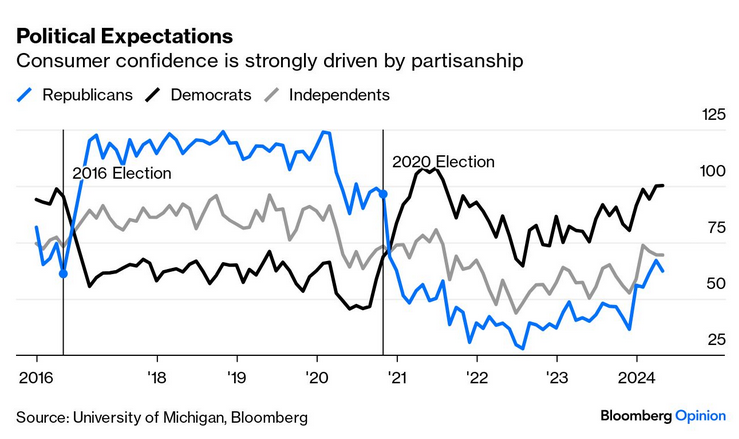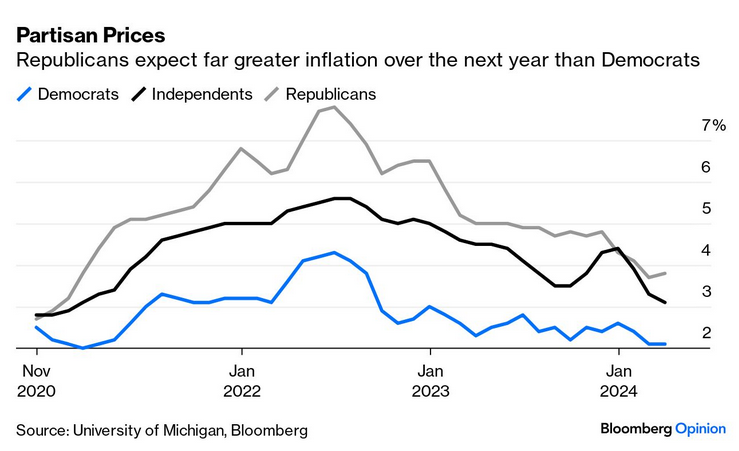May 13, 2024
All eyes on USA inflation data
- New York Federal Reserve monthly consumer inflation expectations Monday
- Labor Department report on producer prices Tuesday
- Consumer prices Wednesday
We shall see where those numbers are at an report back. Expectations are not actual inflation numbers, but in the USA are enough to cause political problems. The reality distortion of USA partisan politics is rather strong:


There is a similar thing going on all over the world. The far right and the centrist liberals see a different world from each other. And, I would say a different world than what actually exists. Such a situation leads terrible outcomes.
The question is, can we do anything about it? We live in a time where the information people want to believe is the information that they are provided. Information that tests one's world view is easily avoided. The result is a slide into a strange construction of our own making that cannot possibly represent the real world.
The strange thing is that we all seem to know this implicitly, but are happy to not adjust our behaviour to do anything about it. None of this is new behaviour in Western cultures. We have many words for it such as reification, false consciousness, mythology, manufactured consent. The process is even understood on the left.
However, it stops the species from doing better at a time where our survival is on the line.
The institutions of the left should have as a primary goals the disruption and piercing of false consciousness. I fear that the current situation involving weaponized social media and short term political needs mean we too easily fall victim to a similarly untethered political philosophy in action.
As activists, we must be ever vigilant against this tendency.
Trust in official statistics
All of the above is made more difficult when there is legitimate trust issues in official statistics.
In the UK, real doubts about the accuracy of labour market statistics is spreading to adjacent measures such as job vacancy data.
Most of this is because of a reliance on cheaper polling methods to collect information. Instead of directly surveying businesses, the statistics agencies around the world have leaned more heavily on job advertising.
Why does this matter? Under the orthodox neoclassical economics, job vacancies show tightness in the labour market. If the stats show too many job vacancies, central bankers think that the labour market is loose and will delay their rate cutting.
The importance of official statistics slipped for a while during the late 1990s and early 2000s when neoliberal ideology said markets can basically look after themselves. Cuts came for statistical agency funding and changes were made to rely on cheaper methods and/or not responding to or understanding fundamentals about the collection of data.
Turns out that economic planning and action is still necessary. But, of course, it takes years to figure out your stats are wrong and more years to figure out how to fix them. In the mean time, policy makers are left to guess based on politically motivated "think tank" data and advertising questioning the official information.
The reality filter is difficult to pierce if we do not attempt to measure reality correctly.
In Canada, we have some of the lowest number of collected statistical measures of the OECD countries. We tend to look at the USA and private data sets to manage our economy. It is a problem that reaches back to even before the 1990s.
Bad data. Bad analysis. Bad politics. Bad economy. Bad future.
It sort of goes together right now.
We can do better. We must fund our statistical agencies, universities, and our industrial research organizations to establish a baseline of information. Without it, our calls for industrial strategy to support the necessary transitions in our regulatory and economic environment are impossible.